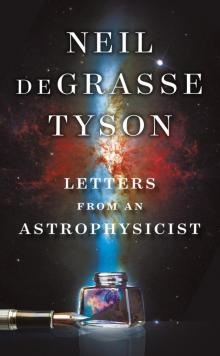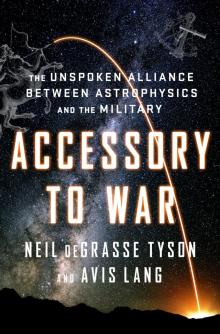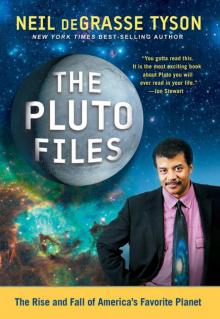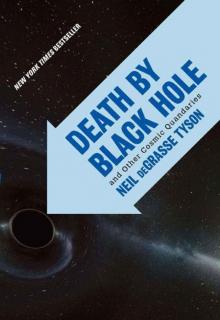- Home
- Neil DeGrasse Tyson
Accessory to War Page 6
Accessory to War Read online
Page 6
While many ancient writers, no strangers to war, discussed the military advantage afforded by astronomy, Socrates discounts it. In Plato’s Republic, written twenty-four centuries ago (before Archimedes and his mirrors), Socrates and Glaucon debate which branches of knowledge would be useful to the rulers of Athens. Socrates contends, in Book 7, that the most valuable branches “have a double use, military and philosophical” and that a firm command of arithmetic and geometry is essential both for war and for the soul. Glaucon replies that astronomy—by which he means the observation of the seasons, months, and years—is as useful to the general as to the farmer or the sailor, but Socrates doesn’t agree. To him, astronomy is too wedded to observation, too dependent on the senses, and therefore antithetical to noble philosophy.
Two centuries later, in the section of his Histories titled “On the Art of a Commander,”15 the Greek politician-historian Polybius ranks astronomy up alongside geometry. Elaborating on the importance of knowing the movements and positions of the Sun, the Moon, and the constellations of the zodiac, he writes:
It is time, indeed, which rules all human action and especially the affairs of war. So that a general must be familiar with the dates of the summer and winter solstices, and the equinoxes, and with the rate of increase and decrease of days and nights between these; for by no other means can he compute correctly the distances he will be able to traverse either by sea or land. He must also be acquainted with the subdivisions of day and night so as to know when to sound the [reveille] and to be on the march; for it is impossible to obtain a happy end unless the beginning is happily timed.16
Neglect these matters, warns Polybius, and you’ll make a mess of things. Bad timing is fatal. To prove his point he cites a number of examples, including a precipitous decision taken on August 27, 413 BC, during the siege of Syracuse, a major campaign of the Peloponnesian War (though not the siege of Syracuse in which Archimedes is said to have deployed his mirrors):
Nicias, again, the Athenian general, could have saved the army before Syracuse, and had fixed on the proper hour of the night to withdraw into a position of safety unobserved by the enemy; but on an eclipse of the Moon taking place he was struck with terror as if it foreboded some calamity, and deferred his departure. The consequence of this was that when he abandoned his camp on the following night, the enemy had divined his intention, and both the army and the generals were made prisoners by the Syracusans. Yet had he only inquired from men acquainted with astronomy so far from throwing away his opportunity owing to such an occurrence, he could have utilized the ignorance of the enemy.17
It’s hard to avoid lunar eclipses. When they occur, on average every couple of years, they last hours, and the entire half of Earth facing the Moon will witness them. That’s because, unlike a total solar eclipse—an event that takes place on Earth’s surface—a total lunar eclipse takes place in space, with the full Moon entering Earth’s shadow. In fact, in ancient Greece and Rome, the intelligentsia already understood that, as Alan Bowen, a historian of the exact sciences in the classical world, puts it, “the antidote to the fear induced in the ignorant at the occurrence of an eclipse is learning that eclipses take place in the regular course of nature and are not omens or signs from the gods.”18
During his fourth voyage to the New World, Christopher Columbus decided that an upcoming lunar eclipse would be a good way to threaten the locals on Hispaniola, who, because they produced almost no excess food, had been unable to supply Columbus with enough provisions to ensure that his crew remained loyal to him. He warned the locals that God, punisher of evildoers, would make the Moon disappear if they did not hand over more food. He even specified when this would happen. Divine wrath aside, Columbus—being familiar with recently compiled eclipse tables—knew that astronomy would back up his threat. February 29, 1504, would be the night. The eighteenth-century British historian Edward Drake relates the incident:
[K]nowing that there would be an eclipse of the moon within three days, [Columbus] sent an Indian, who spoke Spanish, to assemble the [community] on an affair of the utmost importance to their welfare: being met on the day preceding the eclipse, the Indian told them that the Christians believed in God who made heaven and earth [and who] was angry with them for not supplying his distressed servants with provisions, and would therefore chastise them with famine and other calamities, and, as a proof that what he told them was true; they should, that very night, observe the moon rising with a bloody aspect, as a warning of the punishment God would inflict upon them.
[T]he eclipse beginning as soon as the moon was up, and the darkness continuing to increase, it put them in such a consternation, that they hastened to [entreat] the Admiral that he would pray to God to be no longer angry with them, and they would bring as much provisions as he would have occasion for.
[R]etiring to his cabin, [Columbus] shut himself up till the eclipse was at its heighth, when he came out and told them he had prayed for them, promising they would be good . . . ; whereupon God had forgiven them, and they should see the moon by degrees, recover her usual appearance.19
Fourteen centuries before Columbus, Ptolemy had supplied the mathematics needed to compute the timing, magnitude, and duration of eclipses. Nevertheless, to the unlettered, they continued to seem special and portentous. In fact, every event and feature in the heavens, whether special or ordinary, has long been regarded as relevant to or even directly causal for the affairs of humans on Earth, if only its meaning could be divined.
Enter astrology.
For the Mesopotamians, astrology and astronomy were more or less the same thing. For the emperors of ancient China, as for the ancient Greeks, astrology and astronomy were intertwined. The skies spoke; the skywatcher listened and translated. Copernicus did astrology; Tycho Brahe did astrology; the great Galileo did astrology. Johannes Kepler, though critical of many aspects of astrology and aware of its cynical use, cast hundreds of horoscopes. In 1601, just after becoming imperial mathematician to the Holy Roman Emperor Rudolf II, Kepler published a treatise entitled Concerning the More Certain Fundamentals of Astrology; a quarter century later he served as astrologer to General Albrecht von Wallenstein.20
The modern distinction between astronomy and astrology was, at one time, fuzzy and irrelevant, just like the distinction between alchemy and chemistry or between magic and medicine. Promoting the propitious, avoiding calamity, and forecasting death suggest astrological interpretation. Yet prediction, which is an offshoot of analysis, can be exacting and scientific, given the right practitioner. Accurate observation of the skies, combined with a grasp of physics and a cartography of the cosmos, is the cornerstone of both.
Claudius Ptolemy, a renowned second-century AD Alexandrian mathematician, addressed all of the above. Besides writing astronomy’s formidable founding document, the Almagest, he wrote the influential compilation of the geographical and cartographical knowledge of his day, the Geographike Hyphegesis, and the equally influential astrology opus, the Tetrabiblos. He begins Tetrabiblos by asserting a link between sky and Earth and the dual nature of sky studies:
Of the means of prediction through astronomy . . . , two are the most important and valid. One, which is first both in order and in effectiveness, is that whereby we apprehend the aspects of the movements of sun, moon, and stars in relation to each other and to the earth, as they occur from time to time; the second is that in which by means of the natural character of these aspects themselves we investigate the changes which they bring about in that which they surround.21
Ptolemy did not doubt that the cosmos was a unified, harmonious system (the Greek word kosmos means “order” as well as “world”) or that the celestial affected the terrestrial. He traced a natural progression from heavenly configurations within and among the zodiacal constellations to the differing strengths of their influence on different sectors of Earth, to the general temperaments of persons born in those sectors, to the particular temperaments of persons born at particular times when partic
ular influences were prominent. The sky was the seal that stamped the wax.22
By calculating where everything was, is, and will be on the sky, the astrologer could assign cause—preferably before, but sometimes after, the effect. Excesses of the body, flaws and felicities of character, distresses of the soul, and disruptions of society and nature could be traced to a source. Jupiter and Venus were temperate and moistening, hence fertile, active, and beneficent; Saturn and Mars were chilling and drying, hence destructive. Leo the Lion, the Sun, Mars, Saturn, and Jupiter embodied masculinity; Virgo the Virgin, the Moon, and Venus embodied femininity. Europe, the northwestern quadrant of the known world, was familiar with Leo, Aries the Ram, and Sagittarius the centaur Archer and was governed by Jupiter and Mars; therefore, wrote Ptolemy, the men there were warlike, commanding, clean, fond of liberty, and indifferent to women. The inhabitants of Britain and Germany, he added, were especially fierce because of their greater familiarity with Aries and Mars.23
Your horoscope (hora, “hour”; skopos, “watcher”), which derived from the Sun’s location among the stars at the time of your birth, delineated your basic individual tendencies. In addition, the changing skies triggered changing effects. Knowing your own as well as the planets’ proclivities, you could calmly prepare yourself for what lay ahead and, if necessary, rein in your worst tendencies so as to reduce your risk. Events and cities were subject to similar influences: while celestial configurations predisposed an individual to violence or acquiescence, and a polity to peace or endless strife,24 they could also signal a coming shipwreck, earthquake, or robbery, or suggest the most advantageous timing for a marriage, a coronation, a prayer, or an invasion.25
The influence of classical astrology lasted for centuries. Astrologers cast horoscopes not only for Jesus and Pope Urban VIII but also for the fate of Florence and Rome and for the belligerent parties in World War I. They predicted or retroactively explained the assassination of monarchs, the success of empires, the rise of religions, even the end of history.26 Not that everybody thought Ptolemy’s legacy was a good thing. Astrologers, contended the critics, usurped power that rightly belonged to others; horoscopes were too persuasive. Even Ptolemy himself had reservations.27 Hardly had the ink of Tetrabiblos dried than astrologers began to be expelled from Rome. The practice of astrology was restricted or even banned by the emperors Augustus, Diocletian, Theodosius, and Justinian. Saint Augustine said it was untenable to propose that the stars, whose power derived from God, could cause evil. Martin Luther pointed out that numerous astrologers had predicted a Great Flood of 1524, which didn’t happen, whereas none predicted the massive Peasants’ Revolt of 1524–25, which did. Urban VIII, whose death had been misforecast for 1630 by a renowned abbot-astrologer, issued a papal bull against astrologers in 1631.28
But even vocal opponents of astrology sometimes played it safe: Francesco Guicciardini, a politician in Renaissance Florence who ridiculed the widespread tendency to remember astrologers’ successes while forgetting their far more numerous mistakes, had his own horoscope cast by a murderer. Nor did astrology vanish with the rise of rationalism or the increasing interest in observational astronomy or the spread of the telescope, despite the sudden appearance of brilliant new stars (supernovas) in 1572 and 1604, not to mention Galileo’s discoveries in 1609 and 1610 of the mountains and craters of the Moon, the four largest satellites of Jupiter, and the two seeming companions of Saturn—all of which made astrology’s foundations tremble. Suddenly the map of the sky, and consequently the analysis of celestial influences, had to be revised. William Herschel’s discovery in 1781 that Uranus was a planet further confounded the profession.
Beliefs, however, have a strong grip. Although many educated Europeans came to reject celestial determinism in the lives of individuals, many continued to embrace the idea that the stars and planets affect the more general course of nature. Diplomats advised a limited reliance on astrology rather than an all-out rejection of it, especially in times of war.29 The English philosopher-scientist Francis Bacon discounted the doctrine of horoscopes and felt astrology to be “so full of superstition, that scarce anything sound can be discovered in it,” yet declared that purifying it was preferable to discarding it altogether.30 Britain’s first Astronomer Royal, John Flamsteed, trod lightly on astrologers’ toes: referring to the rare triad of Saturn–Jupiter conjunctions in 1682–83, he wrote that while astrologers had “affrighted” the “Common People” with “fearful Predictions of direful events . . ., the more Judicious are desirous to know how often and at what time their Conjunctions happen.”31 Galileo, too, was caught between the old and the new. He himself drew up horoscopes for his friends, his daughters, his patrons, himself. The dedication of his paradigm-destroying Sidereus Nuncius, published in March 1610, includes a panegyric to Jupiter and to his patron Cosimo II de’ Medici, whose horoscope Galileo slightly rigged to make that regal planet maximally dominant.32
Astrological prognostication kept its hold well into the seventeenth century. After enduring a few body blows in the eighteenth century, it gained ground in the nineteenth, survived the twentieth, and is alive and well across the globe in the twenty-first, especially among those with limited science literacy.33 Few people, including those who hold power, are immune to the suspicion that astrology might have something to offer or to swear by.
Take America. For most of the past thirty years, the fraction of the US population that embraces astrology has held steady at one-fourth but is now growing (about the same fraction believes in reincarnation, while twice as many have had what they call a “mystical experience”). While Ronald Reagan was president, he and his wife Nancy consulted a Vassar-grad astrologer who prescribed the timing (sometimes right down to the second) of presidential election debates, the announcement of Justice Anthony Kennedy’s appointment to the Supreme Court, press conferences, takeoffs of Air Force One, State of the Union addresses, and much else. Right after 9/11, a “prophecy” ostensibly written by the illustrious, obscurantist sixteenth-century astrologer and seer Nostradamus raced across the Internet, further terrifying masses of already terrified Americans and further priming them for retaliation. In fact, the quatrain was an intentional fabrication, written for a twentieth-century student essay: “Two brothers torn apart by Chaos, / while the fortress endures, / the great leader will succumb, / The third big war will begin when the big city is burning.” Embellishments soon included “On the 11th day of the 9 month, / two metal birds will crash into two tall statues” and “In the city of york there will be a great collapse.” In 2004, after several years of intensive fear-promotion by media and public officials alike, the most popular search term on AOL was “horoscope.” On the night of September 4, 2008, as a vast-screen video introduced John McCain to the party faithful at the Republican National Convention, to the accompaniment of swelling music and applause, a sonorous voiceover proclaimed: “The stars are aligned; change will come.”34
Or take India, where astrology is Vedic rather than Ptolemaic, and the Moon figures more prominently than the Sun in horoscopes. Today, as in the past, few Hindus marry without consulting—and obeying—an astrologer. As the diplomat, journalist, and writer Khushwant Singh put it: “Astronomical harmony was the one guarantee of happiness.” On November 27, 2003, twelve thousand couples got married in New Delhi because Jupiter’s “planetary mischief” would be kept at bay that night. In late October and early November 2006, Delhi was again awash in weddings, this time because even couples whose discordant horoscopes would normally rule out a marriage were being assured of a happy outcome. But matters of matrimony are far from the only domain where astrology rules: political candidates’ nomination papers are filed, and the winners are sworn in, at astrologically opportune times. In 2001, with the Bharatiya Janata Party in power, publicly funded Indian universities were urged to offer courses in Vedic astrology. Many Indian scientists and academics vilified the policy—“For our Government to send satellites into space yet permit astrology to be t
aught using public funds is too great a contradiction to bear further mention”—but it was upheld by the Supreme Court of India.35
In his panoramic 2007 novel Sacred Games (now a Netflix series), Indian-American writer and computer geek Vikram Chandra offers an extraordinary depiction of astrology wedded to annihilation. One of his characters is a guru whose goal is to engineer the nuclear annihilation of the city so as to start Earth’s cycle of time and life afresh. Speaking to a gang kingpin who has become his disciple, he says,
Think of life itself. Do you think it has no violence in it? Life feeds on life, Ganesh. And the beginning of life is violence. Do you know where our energy comes from? The sun, you say. Everything depends on the sun. We live because of the sun. But the sun is not a peaceful place. It is a place of unbelievable violence. It is one huge explosion, a chain of explosions. When the violence ceases, the sun dies, and we die. . . . Have not holy men fought before? Have they not urged warriors to battle? Does spiritual advancement mean that you should not take up weapons when confronted by evil? . . . We must resist this so-called peace which emasculates spirituality and makes it weak.36
Money, an overwhelmingly obvious source of power, is another matter in which astrologers are hard at work. Read the business press, and you’re likely to run across a quote from the economist John Kenneth Galbraith: “The only function of economic forecasting is to make astrology look respectable.” But plenty of people seem to feel that money is power and that astrology is control, and that if you put the two together, you’ve got control over money. The Gilded Age banking magnate John Pierpont Morgan reputedly said, “Millionaires don’t hire astrologers, but billionaires do.” Both Morgan and Seymour Cromwell, president of the New York Stock Exchange from 1921 to 1924, consulted a high-profile astrologer named Evangeline Adams, who received her clients in a suite above Carnegie Hall.37 More recent financial astrologers’ mottoes and book titles may give skeptics pause (“Market timing by planetary cycles and technical analysis”; Planetary Harmonics of Speculative Markets), but investors, fund managers, bankers, and corporate executives still seek their advice. Statistically, of course, amid all the misses there’s the occasional hit: one astrologer forecast that the stock market would plummet in October 1987; another forecast that gold would hit $487 an ounce in 2005. Horoscopes can be, and are, drawn up for a bond, a Treasury bill, a company, or even a stock exchange, based on the hour of its first offering or its incorporation or the start of trading.38

 Letters from an Astrophysicist
Letters from an Astrophysicist Accessory to War
Accessory to War The Pluto Files: The Rise and Fall of America's Favorite Planet
The Pluto Files: The Rise and Fall of America's Favorite Planet Death By Black Hole & Other Cosmic Quandaries
Death By Black Hole & Other Cosmic Quandaries